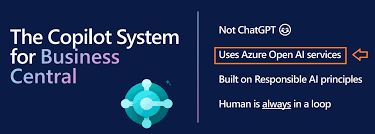
In Microsoft Dynamics 365 Business Central, the role of a copilot is increasingly essential, especially with the integration of AI and advanced features to assist business users in their day-to-day operations. Here’s an overview of the key roles and functions of a copilot in Business Central:
1. Data Analysis and Insights
- Automated Insights: Copilot can analyze large volumes of data to provide actionable insights. This includes identifying trends, outliers, and anomalies in financial data, sales, inventory, etc.
- Predictive Analytics: By leveraging AI and machine learning, the copilot can predict future trends, such as sales forecasts, inventory needs, and cash flow projections.
2. Task Automation
- Routine Task Automation: Automate repetitive tasks such as data entry, report generation, and routine financial reconciliations.
- Workflow Automation: Set up automated workflows for approvals, notifications, and other business processes, reducing manual intervention and speeding up operations.
3. Personalized Assistance
- Guided Assistance: Provide step-by-step guidance for complex tasks, such as setting up new accounts, configuring modules, or running financial reports.
- Recommendations: Offer personalized recommendations based on user behavior and historical data, such as suggesting inventory reorder levels or optimizing pricing strategies.
4. Enhanced Decision-Making
- Scenario Analysis: Assist in performing scenario analysis and what-if modeling to evaluate different business strategies and their potential impacts.
- Real-Time Data Access: Provide real-time access to critical business data, ensuring decision-makers have the most up-to-date information.
5. Improving Collaboration
- Communication Integration: Integrate with communication tools like Microsoft Teams to facilitate collaboration between team members. Share reports, dashboards, and insights directly within communication channels.
- Task Assignment: Assign tasks and track their completion, ensuring that team members are aligned and accountable.
6. Customer and Vendor Interaction
- Automated Communication: Send automated emails and notifications to customers and vendors regarding orders, payments, and other transactions.
- Customer Insights: Analyze customer data to provide insights on purchasing patterns, preferences, and potential upsell opportunities.
7. Financial Management
- Financial Reporting: Generate detailed financial reports and dashboards, providing a comprehensive view of the company’s financial health.
- Budgeting and Forecasting: Assist in creating budgets and financial forecasts, comparing actual performance against targets.
8. Inventory and Supply Chain Management
- Inventory Optimization: Analyze inventory levels to suggest optimal stock levels, reducing carrying costs and minimizing stockouts.
- Supply Chain Insights: Provide insights into supply chain performance, identifying bottlenecks and areas for improvement.
9. Compliance and Risk Management
- Regulatory Compliance: Ensure that business processes and financial practices comply with relevant regulations and standards.
- Risk Identification: Identify potential risks in financial and operational processes, suggesting mitigation strategies.
10. User Training and Support
- Onboarding Assistance: Help new users get up to speed with Business Central features through guided tutorials and in-app help.
- Ongoing Support: Provide real-time support for users facing issues, reducing downtime and enhancing productivity.
Summary
The copilot in Business Central acts as an intelligent assistant that enhances efficiency, improves decision-making, and streamlines operations across various business functions. By leveraging AI, machine learning, and automation, it helps businesses optimize their processes, reduce costs, and drive growth.
https://www.linkedin.com/feed/update/urn:li:activity:7216035010758238210

